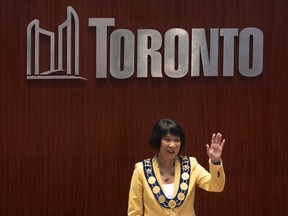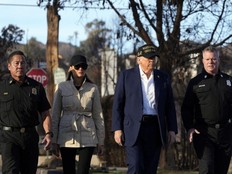Councillors quiet as ‘Black-mandated’ shelter news prompts outrage

Article content
News of Toronto’s impending “black-mandated” homeless shelter has drawn outrage online — and silence so far from city council.
As the Toronto Sun has reported, city hall took applications from would-be operators of Toronto’s first black-mandated shelter until the end of the day on Friday.
According to a city document, the shelter would be run by a black-mandated non-profit, also called a “B3” — meaning “an organization that is led by a majority of paid staff and board members who self-identify as black or are of African descent.” A B3 must serve “Toronto’s diverse black communities,” both in practice and in an explicit mandate.
The chosen organization does not need experience in running a shelter, but should find “mentors” to guide operations, city documents say.
The details prompted outrage online, expressed in emails and comments. People on the Sun’s comment section and on websites such as X and Reddit decried the concept as divisive and inherently discriminatory.
A day after the Sun published its story, the collective number of critical comments appeared to number in the thousands.
The Sun reached out via email to Mayor Olivia Chow and Toronto’s 24 current councillors, requesting any comments the city’s leaders might have on the B3 shelter concept. As of Friday evening, the Sun had yet to get any response from any of them.
However, in a scathing open letter, a former municipal politician warned a “race-based shelter” would be “a mistake.”
Peter Clarke, in pre-amalgamation days a councillor for North York, wrote to Toronto’s city clerk and the members of council to slam the B3 shelter idea as “soft segregation” and “a betrayal of the principles that underpin Canadian democracy.”
“In seeking to correct injustice, the city may be establishing a dangerous precedent that sacrifices inclusion for ideology,” Clarke wrote.
“Toronto, long celebrated for its multicultural fabric, is now quietly advancing a policy that risks tearing that fabric at the seams.”

A 22-page set of guidelines for prospective shelter operators includes a four-page glossary of terms such as “anti-racism,” “diaspora,” “interpersonal racism” and “structural racism.” The section on providing financial details, meanwhile, consists of two short paragraphs.
The document lists a number of operational requirements for the shelter, such as running 24/7 all year long, and committing to audits by city hall. Some of the requirements appear specific to this shelter, such as stipulated “safe spaces for black clients and staff,” “culturally appropriate food and nutrition” and black-specific toiletries and hygiene products as laid out in the city’s confronting anti-black racism, or CABR, directives.
It’s unclear just how residents would be matched with the shelter, or if someone could be turned away because of race.
The B3 shelter competition follows a similar process for an indigenous shelter, which could move to construction as soon as this year.
City hall declined to make anyone available for an interview about the new shelter. In a statement, Loretta Ramadhin, planning director for Toronto’s shelter and support services division, told the Sun it is “important to ensure community services are reflective of the diversity in our city.”
“Black individuals are overrepresented among people experiencing homelessness,” Ramadhin said, citing a 2021 study that found they make up 9% of Toronto as a whole but 31% of its homeless population. The need has only grown amid an “unprecedented” surge of refugee claimants in the city in the years since, she said.
While city representatives would not give details about the number of applications received, or where it’s likely a B3 shelter might go, the city said in an email that the winning applicant will be picked this year, with an opening date expected between 2028 and 2030.
A recent survey of people in and around the shelter system found that of the 6% of respondents who think Toronto’s homelessness services have improved in the last five years, many appreciated the city’s “use of an equity lens and addressing diverse needs.” However, the vast majority of respondents, 66%, said services are worse now than five years ago.











Postmedia is committed to maintaining a lively but civil forum for discussion. Please keep comments relevant and respectful. Comments may take up to an hour to appear on the site. You will receive an email if there is a reply to your comment, an update to a thread you follow or if a user you follow comments. Visit our Community Guidelines for more information.